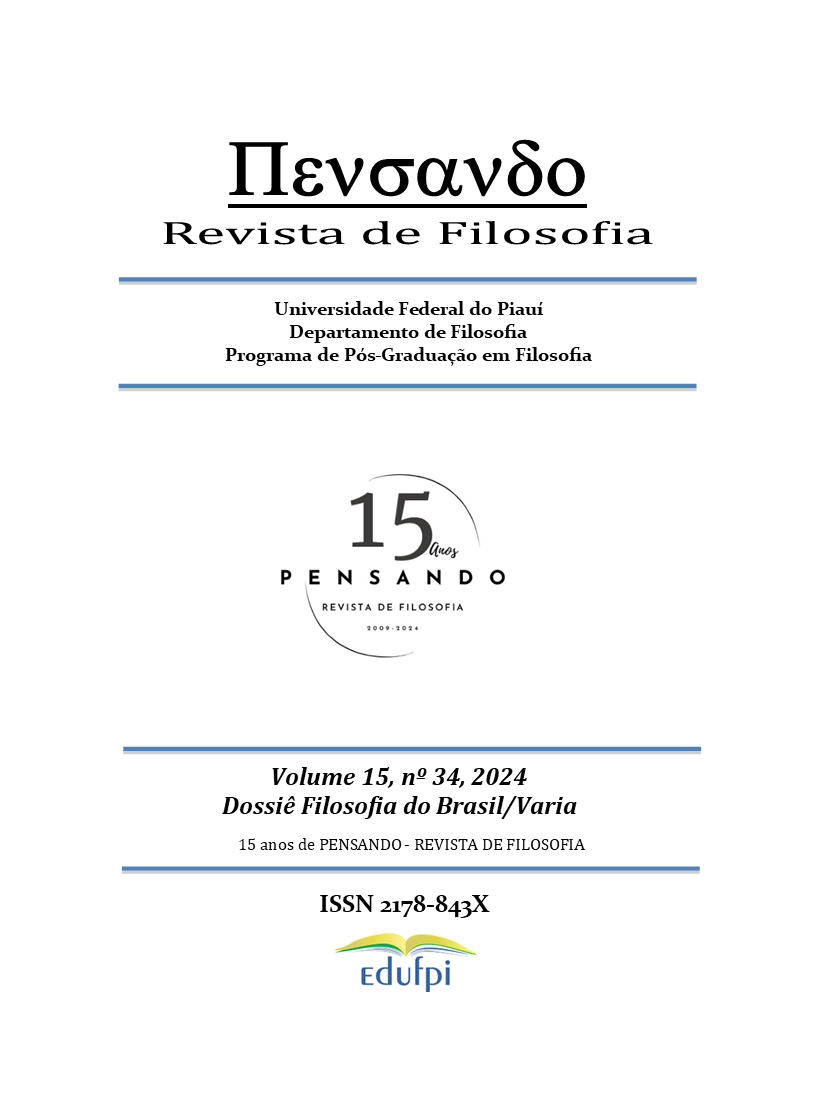Factualism about practical reasons
a defense
DOI:
https://doi.org/10.26694/pensando.vol15i35.4498Palabras clave:
reasons for action, factualism, error cases, Jonathan Dancy, DisjunctivismResumen
The paper's aim is to investigate if factualism about practical reasons can provide a satisfactory answer to the problem of error cases. Some philosophers have assumed that factualism is strongly threatened by the possibility of false belief. They claim that if the agent is mistaken about the relevant fact, then there is no fact to which she can appeal to justify and explain her action. So to assess the strength of the objection, I consider Jonathan Dancy’s factualist response to the problem and I argue that, while quite convincing, it requires a commitment to the awkward idea that intentional explanation can be non-factive. Dancy’s account implies denying the widely accepted thesis that a true explanation cannot have a falsehood as its explanans. But contrary to what one might think, I defend that factualism can deal with error cases without having to endorse Dancy’s controversial idea. To show this, I develop a disjunctivist form of factualism that can solve the problem at stake by keeping what is most promising in this theory: that all because-constructions are factive. If my thesis succeeds, then I think there is no reason for us to give up factualism in the face of error cases.
Citas
DANCY, Jonathan. “Why There is Really No Such Thing as the Theory of Motivation”. Proceedings of the Aristotelian Society, 95, 1995 pp. 1:18.
DANCY, Jonathan. Practical Reality. Oxford: Oxford University Press, 2000.
DANCY, Jonathan. “A Précis of Practical Reality”. Philosophy and Phenomenological Research, 67(2), 2003, pp 423-28.
https://doi.org/10.1111/j.1933-1592.2003.tb00298.x
DANCY, Jonathan. “Acting in the Light of the Appearances”. In: MACDONALD, Cynthia; MACDONALD, Graham. McDowell and his Critics. Malden: Blackwell Publishing, 2006, pp. 121-31.
DANCY, Jonathan. “On How to Act Disjunctively”. In: HADDOCK, Adrian; MACPHERSON, Fiona (Eds). Disjunctivism: Perception, Action, Knowledge. Oxford: Oxford University Press, 2008, pp. 29-49.
DANCY, Jonathan. “On Knowing One’s Own Reasons”. In: LITTLEJOHN, Clayton; TURRI, John (Eds). Epistemic Norms, New Essays on Action and Assertion. Oxford: Oxford University Press, 2014, pp. 81-96.
DAVIDSON, Donald. “Actions, Reasons, and Causes”. The Journal of Philosophy, 60, 1963, pp. 685-700. https://doi.org/10.2307/2023177.
GETTIER, Edmund L. “Is Justified True Belief Knowledge?” Analysis 23, 1963, pp. 121-3. https://doi.org/10.1093/analys/23.6.121
HADDOCK, Adrian; MACPHERSON, Fiona (Eds). Disjunctivism: Perception, Action, Knowledge. Oxford: Oxford University Press, 2008.
HARMAN, Gilbert. “Moral Relativism Defended”. Philosophical Review, 84, 1975, pp. 3-22.
HEUER, Ulrike. “Reasons for Actions and Desires”. Philosophical Studies, 121, 2004, pp. 43-63. https://doi.org/10.1023/B:PHIL.0000040381.54358.08.
HIERONYMI, Pamela. “Reasons for Action”. Proceedings of the Aristotelian Society, 111, 2011, pp. 407-27. https://doi.org/10.1111/j.1467-9264.2011.00316.x.
HORNSBY. Jennifer. “A disjunctive conception of acting for reasons”. In: HADDOCK, Adrian; MACPHERSON, Fiona. (Eds). Disjunctivism: Perception, Action, Knowledge. Oxford: Oxford University Press, 2008, pp. 244-61.
HUTCHESON, Francis. Illustration on the Moral Sense. Cambridge: Harvard University Press, 1971.
KORSGAARD, Christine. Self-Constitution: Agency, Identity, and Integrity. Oxford: Oxford University Press, 2009.
MCDOWELL, John. “Criteria, Defeasibility and Knowledge”. Proceedings of the British Academy, 68, 1982, pp. 455-79.
MCDOWELL, John. Mind and World. Cambridge: Harvard University Press, 1994.
MCDOWELL, John. “Acting in the Light of a Fact”. In: BAKHURST, David; HOOKER, Brad.; LITTLE, Margaret O (Eds). Thinking about Reasons: Themes from the Philosophy of Jonathan Dancy. Oxford: Oxford University Press, 2013, pp. 13-28.
QUINN, Warren. Morality and Action. Cambridge: Cambridge University Press, 1993.
PARFIT, Derek. “Reasons and Motivation”. Aristotelian Society, Supplementary Volume, 71, 1997, pp. 99-130.
SANDIS, Constantine. “Can Action Explanations Ever Be Non-Factive?” In: BAKHURST, David; HOOKER, Brad; LITTLE, Margaret O (Eds). Thinking about Reasons: Themes from the Philosophy of Jonathan Dancy. Oxford: Oxford University Press, 2013, pp. 29-49.
SCANLON, Thomas M. Being Realistic about Reasons. Oxford: Oxford University Press, 2014.
SMITH, Michael. The Moral Problem. Oxford: Wiley-Blackwell, 1994.
SMITH, Michael. “Four Objections to the Standard Story of Action (and Four Replies)”. Philosophical Issues, 22, 2012, pp. 387-401. https://doi.org/10.1111/j.1533-6077.2012.00236.x
SNOWDON, Paul. “Hilton and the Origins of Disjunctivist”. In: HADDOCK, Adrian; MACPHERSON, Fiona. (Eds). Disjunctivism: Perception, Action, Knowledge. Oxford: Oxford University Press, 2008, pp. 35-56.
STOUT, Rowland. “Sally’s Reason for Running from the Bear”. In: SANDIS, Constantine (Ed). New Essays on the Explanation of Action. London: Palgrave Macmillan, 2009, pp. 48-61.
TURRI, John. “The Ontology of Epistemic Reasons”. Noûs, 43, 2009, pp. 490-512.
WILAND, Eric. “Theories of Practical Reason”. Metaphilosophy, 33, 2002, pp. 450-67. https://doi.org/10.1111/1467-9973.00239
WILLASCHEK, Marcus. Disjunctivism: Disjunctive Accounts in Epistemology and in the Philosophy of Perception. New York: Routledge, 2012.
WILLIAMS, Bernard. “Internal and External Reasons”. In: WILLIAMS, Bernard. Moral Luck. Cambridge: Cambridge University Press, 1981, pp. 101-13.
Publicado
Cómo citar
Número
Sección
Licencia
Derechos de autor 2023 PENSANDO - REVISTA DE FILOSOFIA

Esta obra está bajo una licencia internacional Creative Commons Atribución 4.0.

























